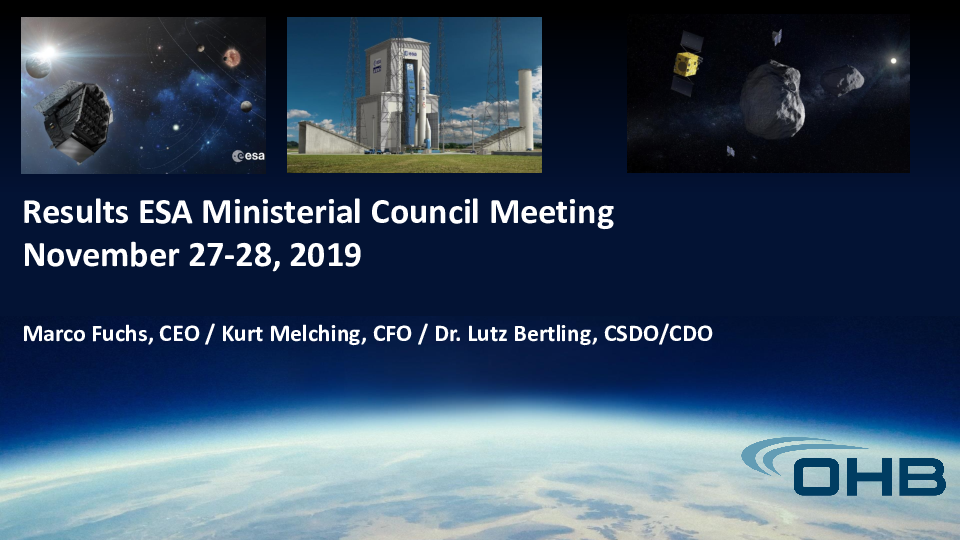Bremen, November 29, 2019. “The successful outcome of the meeting of the ESA Council at Ministerial Level for space has made me happy and relieved,” said Marco Fuchs, CEO of OHB SE. His eye is on the sum of EUR 14.4 billion that the ESA member states are scheduled to invest in European space over the coming years. “And Germany will take the lead,” so Fuchs, commenting on the fact that the German government is the biggest contributor to the ESA with EUR 3.3 billion. “This gives us within the space flight industry great planning certainty for the coming years. The conference has also been a major success for OHB. The ESA has amply fulfilled its role as a trailblazer and has, above all, proven its worth in terms of its organisational principle. This also sends a strong signal to Europe as a whole at a time when the Community is otherwise facing a few problems. I would like to express my particular thanks to the German government’s coordinator for space, Thomas Jarzombek, for the very good and successful conduct of negotiations to further the interests of German space flight.”
1.8 billion for Copernicus
Fuchs considers the area of Earth observation to have received a particular boost: the ESA countries have made available EUR 1.8 billion for the Copernicus program, with Germany contributing EUR 520 million, substantially more than expected. “What this means is that the pot of money is big enough to implement all six planned missions,” added Fuchs. They will now be awarded through competitive tenders. “At OHB we still expect to lead two of the missions and to be involved with others.” According to Fuchs, the most important mission is undoubtedly that concerning CO2 monitoring. “It is by far the most crucial mission for the future measurement of climate change,” stated Fuchs. “And so this is precisely where competition will be fiercest.” Through its commitment to Copernicus, Europe has also shown clearly how serious the ESA states are about not just passively standing by and watching the dangerous changes to the climate and the environment.
Hera is a very important success
In space safety, many were surprised by the fact that more money was made available to the Hera asteroid defense mission. “All told, around EUR 170 million are now available for the first phase. At EUR 60 million, Germany has contributed more than expected, and it leads this mission,” said Fuchs. “The Hera project had already been awarded to OHB, and so we are now flicking all the switches on and beginning development.” The contracts for Hera are due to be signed in the first half of 2020. “Hera is a very important success for us. But the project timetable is very tight, there is only one suitable date for a rendezvous, which of course we must make.”
Augsburg location strengthened
On the subject of space transport, i.e. primarily the Ariane program, the ESA has also committed itself to the issue of launchers to the extent hoped for. Although, Fuchs added, the budgets now decided upon did not change the consequences for the production teams of Ariane 5 at MT Aerospace. And so the announced job cuts there will go ahead. “However, there will once again be demand for the jobs of the production engineers,” said the CEO of OHB, since further development programs have been decided, such as the continuation of the CFRP upper stage. The decisions have strengthened the position of the Augsburg site, there is now planning certainty for the transition phase from the A5 to the A6. MTA now has a solid basis to get through the transition phase. This is primarily thanks to the great support we received from the Bavarian state government, and I would like to express my profound thanks for this.” However, the fact still remains that MTA will continue to have to work on its competitiveness in business terms. Fuchs continued by saying, “One goal is to put MTA as a supplier for the launcher industry on a broader footing and to also deliver rockets to other providers. We cannot and do not want to be a pure Ariane factory.”
The ESA has also made a clear commitment to the mini-launcher market of the future. “The importance of this issue has been unequivocally confirmed and strengthened,” stated Fuchs. “Mini-launchers have been established at the ESA as a necessary addition to the launcher market since this conference.” This is why it makes sense to support the developers of mini-launchers through technology development budgets.

Contact for media representatives:
Marianne Radel
Head of Corporate Communications
Phone: +49 421 2020 9159
Email: marianne.radel@ohb.de
Contact for investors and analysts:
Marcel Dietz
Investor Relations
Phone: +49 421 2020 6426
Email: ir@ohb.de
